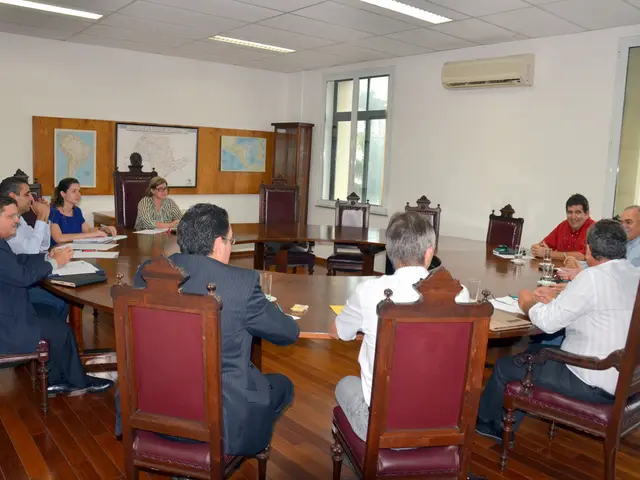International alliances, including the US, intensify their pressure on Putin, hinting at additional sanctions if he disregards a 30-day truce proposal.
30-Day Ceasefire Showdown: Western Powers Threaten Russia
Tensions between Ukraine and Russia have hit a new boiling point, with Western allies putting pressure on Moscow to sign up to a proposed 30-day truce. United States President Donald Trump has upped the ante, threatening additional sanctions if Russia balks at the deal, as reported by various news sources.
A punchy exchange between Trump and Russian President Vladimir Putin seems imminent, as Trump made his latest appeal for an "unconditional ceasefire" between the two nations. Despite repeated rejections from the Kremlin, the West is cracking down on Russia's war machine, with a posse of high-profile leaders set to meet with Ukraine's President Volodymyr Zelensky in Kyiv this weekend.
British Prime Minister Keir Starmer, French President Emmanuel Macron, Poland's Prime Minister Donald Tusk, and Germany's Chancellor Friedrich Merz will join forces with Zelensky on Saturday morning. The leaders will reportedly rally to mount more pressure on Russia to accept the ceasefire terms, lest they face crushing economic sanctions together with the U.S.
Trump has long sought an end to the war in Ukraine, devoting substantial effort to cajole Putin into agreement. High-level meetings between U.S. and Russian officials have taken place, with Trump's special envoy, Steve Witkoff, visiting Russia on no less than four occasions to engage with Putin. Regretfully, Russia has thus far refused to accept the limited ceasefire plan, intended as a stepping stone towards a permanent peace.
Indeed, it appears Trump is losing patience with Putin, as this latest salvo suggests a departure from the administration's previously sympathetic stance towards the Kremlin. Secretary of State Marco Rubio recently hinted that the U.S. might withdraw from talks altogether if there is no progress. Conversely, the U.S. now appears to be spearheading a joint Western effort to pile on the pressure on Russia.
Notably, European leaders have voiced strong support for Trump's proposal. Zelensky indicated that an announcement outlining truce details could be imminent, with the leaders of the so-called "Coalition of the Willing" due to convene in Kyiv on Saturday.
France's President Macron commended Trump's "strong call" for a 30-day ceasefire and called for quick action, eschewing "false pretenses" and "dilatory tactics." He pledged that France would respond firmly should Russia fail to accept the terms, reinforcing the unity of European and U.S. efforts to bring a swift end to the bloody conflict.
In converging with Poland's PM Tusk, Macron confirmed that there would indeed be a "largely virtual and partly in-person" meeting in Kyiv on Saturday. Concurrently, Trump held discussions with leaders of 10 northern European countries that form the Joint Expeditionary Force (JEF). The leaders of the United Kingdom, Denmark, Estonia, Latvia, Lithuania, Netherlands, Norway, Sweden, and Finland called Trump and Zelensky during their summit in Oslo, as reported by several countries' governments.
In a display of solidarity, Ukraine's European allies have cast their votes in defense of Kyiv. As Putin hosted world leaders like China's Xi Jinping at a pompous military parade in Moscow, Western delegations graced the western Ukrainian city of Lviv to endorse the ceasefire proposal and set up a special tribunal to investigate crimes of aggression against Ukraine.
In the thick of the diplomatic dance, China stands aloof, reluctant to alienate its ties with Moscow. For now, the stage is set for a tense standoff between the West and Russia, with global watchers eagerly awaiting Moscow's response to the ceasefire terms.
CNN's Pierre Bairin contributed reporting.
Sneak Peek: Truce Details and Key Players
Ukraine, along with key Western allies, has proposed a 30-day unconditional ceasefire to Russia, beginning Monday. Diplomatic efforts from the U.S., UK, France, Germany, and Poland have backed the proposal, which aims to deliver much-needed respite to the ongoing conflict and alleviate its devastating impact.
A firm stance from Western allies has been evident, with countries threatening economic sanctions if Russia fails to comply with the ceasefire terms. Strict conditions for sanctions have been outlined, signaling a robust response to non-compliance. The European Union's foreign policy chief, Kaja Kallas, the UK's Foreign Secretary David Lammy, Germany's new Foreign Minister Johann Wadephul, and the French Foreign Minister Jean-Noël Barrot are among the top diplomats from various European countries attending this weekend's crucial discussions in Ukraine.
- British Prime Minister Keir Starmer, in support of the proposed 30-day unconditional ceasefire between Ukraine and Russia, has expressed that France will respond forcefully should Russia fail to accept the terms, emphasizing the unity of European and U.S. efforts.
- The leaders of Ukraine, along with key Western allies including the United States, United Kingdom, France, Germany, and Poland, have proposed an unconditional 30-day ceasefire to Russia, starting from Monday, aiming to provide respite to the ongoing conflict.
- Vladimir Putin, in a tense standoff with Western powers, has faced threats of economic sanctions from multiple nations, including the U.S., if Russia fails to comply with the proposed unconditional 30-day ceasefire terms.
- In a united front, European Union foreign policy chief Kaja Kallas, UK Foreign Secretary David Lammy, Germany's new Foreign Minister Johann Wadephul, and the French Foreign Minister Jean-Noël Barrot are set to meet with Ukraine's President Volodymyr Zelensky in Kyiv this weekend, backing the unconditional 30-day ceasefire proposal and signaling strict conditions for sanctions in case of non-compliance.







